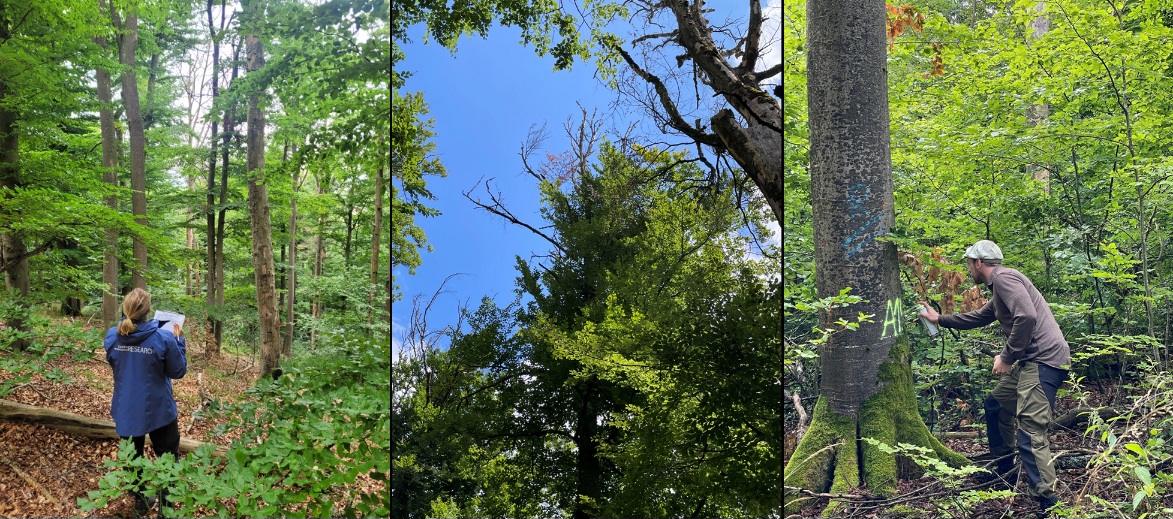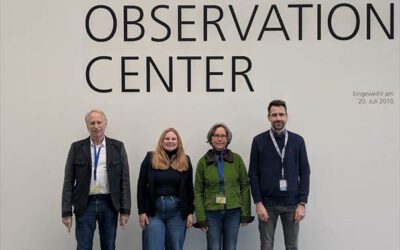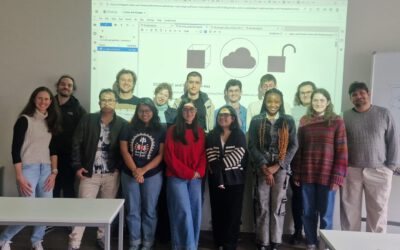In late July, PhD student Julia Rieder and EAGLE student Henning Riecken (InnoLab) conducted field visits to several beech forest stands in Northern Bavaria. Their survey covered regions including the Rhön, the Steigerwald, and areas around Würzburg and Bayreuth, as part of the Beechdecline and EO4CAM projects.
The team focused on assessing crown condition and defoliation levels of European beech (Fagus sylvatica), aiming to better understand the long-term impacts of the 2018–2019 droughts. Many of the surveyed stands continue to exhibit signs of stress—ranging from defoliation and crown dieback to localized mortality. However, some moderately affected trees also showed encouraging signs of recovery.
These field impressions underscore the complex picture emerging in Central European beech forests: while vulnerability remains evident, there are also pockets of resilience worth further study.
you may also like:
EOCap4Africa Training in Kinshasa
This week, 14 students are attending a test run of our Remote Sensing module on Remote Sensing for Biodiversity Conservation at the University of Kinshasa. This module is part of the EOCap4Africa project (funded by the Federal Agency for Nature Conservation, lead Dr....
KI4Stereo – Hybrid kick-off meeting at DLR
KI4Stereo – Hybrid kick-off meeting at DLR: AI-based analysis of stereo image data for tree monitoringOn January 23rd, 2026, a hybrid kick-off meeting was held at DLR to officially launch the research project KI4Stereo (funded under the KMU-innovativ programme,...
Sebastian Buchelt successfully defends PhD on SAR-based monitoring of alpine permafrost
We are very pleased to congratulate our PhD student Sebastian Buchelt on his successful defense of his dissertation, “Potential of Synthetic Aperture Radar time series for mapping and monitoring of small-scale periglacial processes in alpine environments.” His work...
New publication explores how forest structure shapes beetle communities
A new peer-reviewed publication investigates how between-patch heterogeneity and old-growth forest attributes influence the structure of beetle metacommunities in temperate forests. The study, led by Dr. Oliver Mitesser from the Biology Department, combines...
Cubes & Clouds – Cloud-Native Open Data Science for Earth Observation
From 9–13 February 2026, EAGLE Master students took part in the block course “Cubes & Clouds – Cloud Native Open Data Sciences for Earth Observation”, taught by Dr. Insa Otte, Steve Hill, and Peter Zellner (DLR). The course introduced key concepts such as data...
From Earth Observation to Industry: Insights from a graduate at Airbus
Dr. Marius Philipp recently returned to our EORC at the University of Wuerzburg to share insights from his work at Airbus, where he spoke about his work in AI, data science, and applied Earth Observation. His talk highlighted how analytical thinking, remote sensing...









